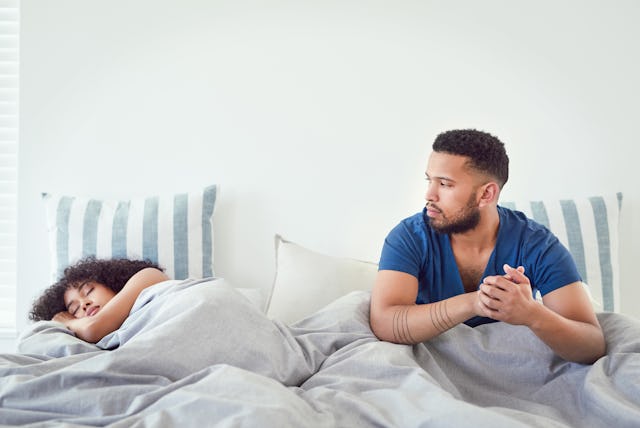Does A King-Size Bed Hint At Relationship Problems? Sleep Shamers Think So
Experts weigh in on the does-size-matter debate.

Do you and your partner sleep in a full bed? A queen? A king? After four years in a full, a few in a queen, and a pregnancy where I just couldn't get comfy, my husband and I upgraded to a king and haven't looked back once. It's not that we don't snuggle. (We do! We do!) It's just that when it's time to sleep, this over-touched mom wants to flip, sprawl, and stretch — all without disrupting her partner's rest.
I always thought this was reasonable and considerate. So, it came as a surprise when we were recently lambasted for this very decision. "How do you find each other to snuggle?!" one detractor asked when she learned of our king bed, aghast. "Do you ever even see each other?!" Let me get out my telescope and check...
I'm not sure when it became OK to sleep-shame other couples, whether they're snuggly sleepers or the sort who seriously need their space to fall and/or stay asleep. Nevertheless, I reached out to sex therapist Melissa Cook, PsyD, and the National Sleep Foundation's Natalie Dautovich, PhD, to set the record straight: Is proximity to your sleeping partner a litmus test for how much you love each other — or anything else?
Here's what they had to say about couples' sleeping arrangements.
The Science of Snuggling
Because feeling socially connected to others makes us feel safer and more able to relax, Dautovich tells me, consensual snuggling can create a sense of comfort and closeness that helps your mind and body chill out. In turn, this can help couples fall and stay asleep, which definitely rings true for me: You bet I scoot over to my husband's side of the bed whenever insomnia strikes.
While no one says king beds prohibit cuddling up, or even that couples who sleep in big beds cuddle less, smaller beds can require you to sleep close to your partner, resulting in more intimacy because of the sheer physical closeness, Cook says. (One point for petite beds, I guess.)
The downside of cuddling — and there is one! — is that sleeping super close to your partner can set you up for more frequent sleep disturbances. You might feel hotter when sharing a small bed (it me), which can lead to discomfort and sweating. Or, as Dautovich points out, you could wake up more easily when your partner repositions, gets up to pee, or snores.
Moreover, "if the closeness feels forced, this could actually lead to emotional distance and awkwardness, which can directly impact sleep," Cook says.
The Case for More Space While You Sleep
Sleeping in a spacious bed helps minimize sleep disturbances, both big and small. "Disruptions to your sleep from your partner can manifest as microarousals or full-on awakenings," Dautovich explains. While you might not even register those microarousals, she says they can still mess with your sleep cycles and contribute to fatigue the following day. Meanwhile, full awakenings can consciously disrupt your sleep, leaving you wide-eyed with thoughts churning, unable to go back to sleep.
All of this is to say that a well-appointed bed means less interrupted, higher-quality sleep, according to Dautovich. (The same goes for sleeping separately, for obvious reasons.) And you don't need an expert to tell you that waking up well-rested makes you more patient, communicative, rational, and in control of your emotions — although Cook said as much: "[Healthy sleep] can contribute to a strong and fulfilled relationship."
Speaking of fulfillment, it's worth noting that there's no known correlation between any bed size and sexual satisfaction, Cook points out. Although larger beds give frisky couples more room to explore... just sayin'!
So, while upsizing your sleeping arrangements could create emotional distance between two people and require a little extra effort (i.e., scooching over) to maintain emotional closeness and intimacy, according to Cook, it feels like a small price to pay for the rest that individuals need to play nice with their partners by day.
The Bottom Line
Does physical closeness in bed have a direct impact on intimacy? Sure, Cook concedes. But how physically close you are to your partner when you sleep doesn't indicate how in love you are or how successful a relationship is going to be. Phewf!
When choosing a bed size, factors like room size, your and your partner's height and weight, budget, and personal preferences should all figure in here — plus, who's actually sleeping in your bed, like furry friends or clingy kids who love a cuddle puddle.
At the end of the day, "some people may find the comfort and closeness of a smaller bed outweighs the potential for sleep disruption," Dautovich says. As for me and my husband? We'll stick with our big ol' bed; no extraneous opinions needed.